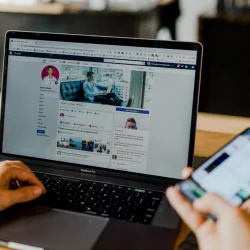Leading SEO Consultant on Achieving Local SEO Magic
Local search engine optimisation (SEO) is the process of making changes to your website so that appropriate local searches bring you more business. These searches take place on Google and other search engines that people use when looking for local information. Typically, local SEO involves optimizing a business's Google My Business profile, local citations, and ranking in local search results.
The importance of local SEO cannot be overstated, especially in a country like Britain where cities and regions are densely populated with businesses vying for the same local clientele. Google’s algorithm for local searches includes proximity, relevance, and prominence as key factors; hence, optimizing for local SEO means you are enhancing your online presence based on these factors.
Key Elements of Local SEO
Paul Hoda, a London SEO consultant helps us truly understand how to optimize for local SEO, and he advises in his page at https://www.paulhoda.uk/seo-consultant/ that it's essential to break down the components as following:
1. Google My Business (GMB) Optimization
Your Google My Business profile is one of the most crucial elements of local SEO. A well-optimized GMB profile provides essential information about your business to both Google and your potential customers, including your business name, address, phone number, and hours of operation. Moreover, it allows you to post updates, respond to reviews, and add photos, which can significantly enhance your local SEO performance.
2. Local Keywords
Using local keywords throughout your website’s content is vital. For example, if you are a plumber in Manchester, keywords like "emergency plumber in Manchester" or "Manchester plumbing services" should appear in your site’s content, including titles, meta descriptions, and body content. This strategy helps search engines understand the geographical focus of your service and improves your visibility in local search results.
3. On-Page SEO Strategies
On-page SEO for local marketing involves ensuring that your website and its content are optimized for the keywords that local consumers are searching for. This includes not only keyword placement but also ensuring that contact details are easy to find and consistent across your website and other online platforms.
4. Reviews and Ratings
Positive reviews are immensely powerful. They do more than just enhance your business’s credibility; they also increase the likelihood of ranking higher in local search results. Encouraging satisfied customers to leave positive reviews on your Google My Business profile and other review sites can significantly impact your local SEO efforts.
5. Local Backlinks
Acquiring backlinks from well-regarded local websites is another crucial factor in boosting local SEO. Links from local newspapers, blogs, and business associations, for example, not only drive direct traffic but also signal to search engines that your website is a reliable source of information within the local community.
Practical Steps for Local SEO Success
Implementing a local SEO strategy requires a practical approach, where each step builds upon the previous to create a comprehensive presence. Here’s how you can begin:
- Claim and Verify Your Google My Business Listing: Start by claiming your GMB listing and ensuring all information is accurate and comprehensive. This is your foundational step for local SEO.
- Optimize for Voice Search: With the increasing use of voice search devices, optimize your content to match the conversational tone of voice queries. Focus on more long-tail keywords that are likely to be spoken rather than typed.
- Focus on Mobile Optimization: Since local search and mobile usage go hand-in-hand, ensure your website is mobile-friendly. A responsive design, quick loading times, and easy navigation are essential for keeping mobile users engaged.
- Utilize Social Media Platforms: Leveraging local social media profiles can help you connect with your community and improve local SEO. Regular updates, promotions, and interactions with local followers can enhance your local relevance.
These foundational steps set the stage for a robust local SEO strategy that can significantly enhance your visibility and attractiveness to local customers in Britain. By focusing on these elements, businesses can create a strong digital footprint that caters specifically to the geographical areas they serve.
Enhancing Local Engagement Through Content
Creating locally-focused content is a powerful way to engage your target audience and improve your local search rankings. Content that addresses local events, news, or issues can resonate more deeply with a local audience, establishing your business as a community figure.
Localized Content Strategies
- Blog Posts About Local Events or News: Writing about local events, such as community fairs or charity events, can increase your relevance in local search queries.
- Guides and How-to Articles: For instance, a guide titled "How to Prepare Your Home for Winter in London" could be highly relevant and useful to residents in the area.
- Case Studies and Success Stories: Sharing customer success stories or case studies focused on local clients can build trust and prove your local expertise.
Leveraging Local Media
Engagement doesn't end with content creation. Promoting your content through local media outlets can amplify your reach. Partnering with local newspapers, radio stations, or even local influencers can drive more local traffic to your website.
Technical SEO for Local Optimization
While content is king in digital marketing, technical SEO remains the backbone of any successful SEO strategy. For local SEO, certain technical aspects need special attention:
- Local Schema Markup: Using schema markup to define your local business details helps search engines understand and display your business information in local search results. Implementing LocalBusiness Schema can give you a significant edge.
- Optimizing Site Speed: A fast-loading website is crucial for keeping potential customers engaged. Local searches often happen on the go, meaning that your mobile site speed is particularly important.
Building and Managing Local Citations
Citations, which are online references to your business name, address, and phone number (NAP), play a pivotal role in local SEO. Ensuring that your NAP is consistent across all platforms and directories helps improve your local search rankings.
Citation Management Tips
- Audit Your Existing Citations: Regularly check your listings on all directories to ensure accuracy. Tools like Moz Local or BrightLocal can automate this process and alert you to inconsistencies.
- Focus on High-Quality Directories: Prioritize getting listed in directories that are well-regarded in your industry and locality. While it’s important to be listed widely, quality often trumps quantity in local SEO.
Monitoring and Adjusting Your Strategy
Like all digital marketing strategies, local SEO is not a set-it-and-forget-it effort. Continuous monitoring and adjusting are required to maintain and improve your local search rankings.
Key Performance Indicators (KPIs) for Local SEO
- Search Ranking for Local Keywords: Regularly check where your business ranks for its targeted local keywords.
- Google My Business Insights: GMB provides valuable insights into how customers find your listing and how they interact with it.
- Website Traffic from Local Searches: Analyze how much traffic comes from local searches and what the conversion rates for this traffic are like.
Conclusion
Achieving local SEO magic doesn't have to be a daunting task. By understanding the fundamental principles and diligently applying the strategies outlined, businesses in Britain can enhance their local search visibility and significantly improve their online engagement with local customers. Remember, the key to local SEO success is continuous optimization and adaptation to the local market's evolving needs and preferences. With a proactive approach to SEO, local businesses can thrive in the digital landscape, attracting more customers and building a strong, local online presence.
Source: https://www.paulhoda.uk/ Address: Kemp House, 152 - 160 City Road, London EC1V 2NX. Phone: 02034882924.
More to Read:
Previous Posts:






